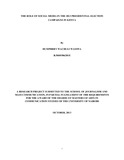| dc.description.abstract | This paper examined the role of social media in the 2013 presidential election campaigns. The study was guided by three main objectives: (i) To investigate the integration of social media into the 2013 presidential campaigns (ii) To explore how social media users utilize SNS for political purposes (iii) To explore the impact of social media on the presidential campaign process. A descriptive survey design was used. This involved administering questionnaires, oral interviews and focus group discussions as tools for data collection. Political pages on social media were also examined. Purposive sampling was used to select the Nairobi County and specifically the University of Nairobi as the location of study. The target population of this study was the urban youth who are most likely to be found in universities. Stratified sampling was used to select a sample of 216 undergraduate students who were issued with questionnaires, and with some participating in focus group discussions. This sampling technique was used because the university students’ population exits in subgroups based on the criterion of departments/faculties in the university. One social media campaign strategist was interviewed. All of the sampled respondents accepted to participate and responded to the questions. A total of 216 questionnaires were distributed and 198 were returned. This represented 91.667% response rate. The data was analyzed by the using a computer software called SPSS. According to the findings of the study, the 2013 presidential candidates integrated social media into their campaigns. This platform was majorly used for sharing information on campaign activities, debate on issues, sharing photos, videos and links, updating of their followers, soliciting for funds, countering propaganda and updating their followers. The findings further revealed that although presidential candidates integrated social media into their campaign they are yet to exploit its full potential. However, social media by itself could not guarantee a candidate victory in the elections. Therefore, presidential candidates need to strike a balance between their campaigns on social media with the ground campaigns to ensure that they reach most of the electorate.
Facebook and Twitter are the most common SNS amongst the urban youth in Kenya. A gender analysis on the respondent’s use of SNS revealed that Facebook had more female users while
Twitter had a majority of male users. However, male users appear to use and spend more time on SNS than the female users. Findings on the political use of SNS by social media users indicated that they used the platform to seek political information, keeping up with trending topics, share political videos, photos and links, discuss political issues, and to get campaign updates. Thus the urban youth were actively involved in politics when they were on SNS. An analysis of the trends in media usage and reliance revealed that Television and Radio were the most popular source of political information on the presidential campaigns for the respondents. SNS, specifically Facebook and Twitter were the second most popular source of political information. These findings show that although more people are getting online for political news and information, they heavily rely on traditional media for the same news. Social media had a significant impact on the campaign process. The platform provided a cheaper means of campaigning for less known presidential candidates. It facilitated the recruitment of volunteers and soliciting of funds which was normally done through party offices and luncheons respectively. The findings of this study shows that the urban youth developed interest in politics, became more knowledgeable, relied on social media for election updates and were able to learn more about the presidential candidates. Majority of the respondents said they did not withdraw their support for a candidate after reading something about them on social media. Therefore, the political information that the respondents came across on social media to a larger extent reinforced their belief on their candidate choice.
The lack of equitable access to the internet across the country and hate speech on SNS emerged as the main challenges in the use of social media for presidential candidates and social media users. Therefore, the government needs to step up its efforts to ensure that all parts of country enjoy universal access to communication technologies such as the internet. Also, the relevant regulatory bodies must ensure that messages shared on SNS are monitored to curb the spread of hate speech, defamation, propaganda and cyber bullying. There is need for development of new policies to ensure that such unlawful acts can be prosecuted in a court of law. | en |

